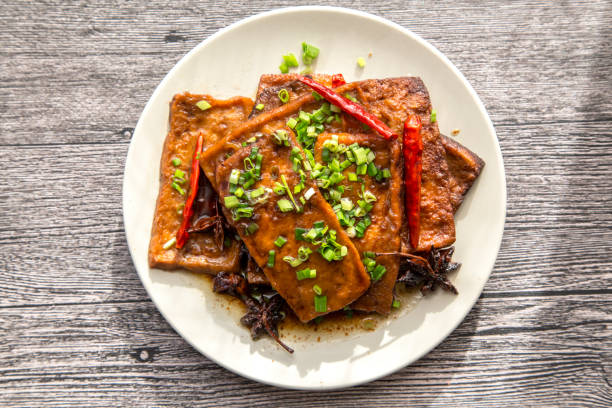Modelling chunks of tofu to look like pieces of chicken? Using seitan (wheat gluten, made from the grain’s main protein) to replace meat for meals during important days of Buddhist festivals and occasions? After all, around 18% of the population subscribe to the religion’s practices. China’s done it all, and has been doing their version of Beyond Meat since the Tang Dynasty, over a thousand years ago. The Western world’s only just recently caught up.
Snapshot: China’s mock meat history
|
Quorn began selling meat substitute products in 1985, but its products have only gained big traction in recent times. The vegetarian food company’s now enjoying its best annual sales in decades. It’s on target to reach £760 million by 2027, thanks to the hot alt-protein trend (or fad?), catapulted into popularity by media darlings Beyond Meat and Impossible Foods. Linda McCartney Foods, another prolific manufacturer of fake meat that launched in 1991, has seen similar success, with sales increasing by 20% between 2016 and 2017.
On the topic of expanding into China, the team of Impossible Foods seemed to be sitting on their hands. Speaking exclusively to AFN previously, it admitted that getting into the Chinese market is ‘on the radar’, but had yet to publicize any “shared timelines, strategy, or products”.
Fast food is also hopping on the fake meat bandwagon – McDonald’s is doing a test run of Beyond Meat patties in Canada to ‘go vegan’. Check out our coverage of it, here.
Innovation or tradition?
The question here is – is the fake meat trend the next step in China’s tradition, or will it be ignored by its 1.4-billion-strong population? In short, Fitch Solutions says “Yes.” It kicked off its latest report by saying, “the fake meat trend can be viewed as the next step in this tradition as opposed to a completely new development, making the embracing of this trend by consumers much more likely.”
But what’s gotten the Chinese, known for guzzling nearly half the pork in the world in 2018, into an alt-protein frenzy? Not for the reasons we might think, apparently.
“The fake meat trend can be viewed as the next step…”
Fitch says demand for fake, or mock meat in China is surging, amid concerns that the domestic supply of real meat isn’t sufficient. The country is now at a pork deficit; it recently went public about digging into its pork reserves. This was due to the outbreak of African Swine Fever (ASF), which has led to the culling of over one million pigs in China, according to the UN’s Food and Agriculture Organization (FAO). On the other hand, China’s plant-based meat industry was worth $910 million in 2018, up 14.2% from 2017, according to a report by US-based Good Food Institute. In comparison, the American market stood at $684 million that year.
“Demand for meat is growing faster in Asia, especially China, than anywhere else on the planet, and satiating the continent’s demand has global implications,” says Impossible Foods.
Check out a previous piece I did, “Who’s bringing China its bacon now that it’s running low?”, here.
We’ve done research into what tech could help the ASF situation worldwide, too. Check it out, here.
Fitch also notes that environmental, ethical, and health concerns may also be driving demand for fake meat in China. Chinese millennials and flexitarians (people who reduce their meat intake for health or environmental reasons) could also lead the pack to the adoption of alternative meat.
Impossible Foods had better get cracking on its expansion plans, as domestic companies are already sprouting up in all sub-sectors of the market to serve the Chinese consumer’s demand for fake meat. Distribution channels for the false meat are vast, and include mass grocery retail, hospitality and e-commerce.
Shenzhen-based Qishan Food, also known as Whole-Perfect Foods, has collaborated with the Chinese government to open a research institute to develop various plant-based products. The company has also recently joined up with Walmart to develop products to sell across China. Meanwhile, startup Zhen Meat is already selling artificial pork moon cakes for the mid-Autumn festival on Taobao, China’s biggest online platform.
According to research firm Markets and Markets, the global meat substitutes market was estimated at $4.6 billion last year and is predicted to reach $6.4 billion by 2023, with Asia the fastest-growing region. But when and how will US fake meat startups make their foray into China? Watch this space.
Know a Chinese ‘fake meat’ startup that you think is hot? Drop me a message at [email protected].





